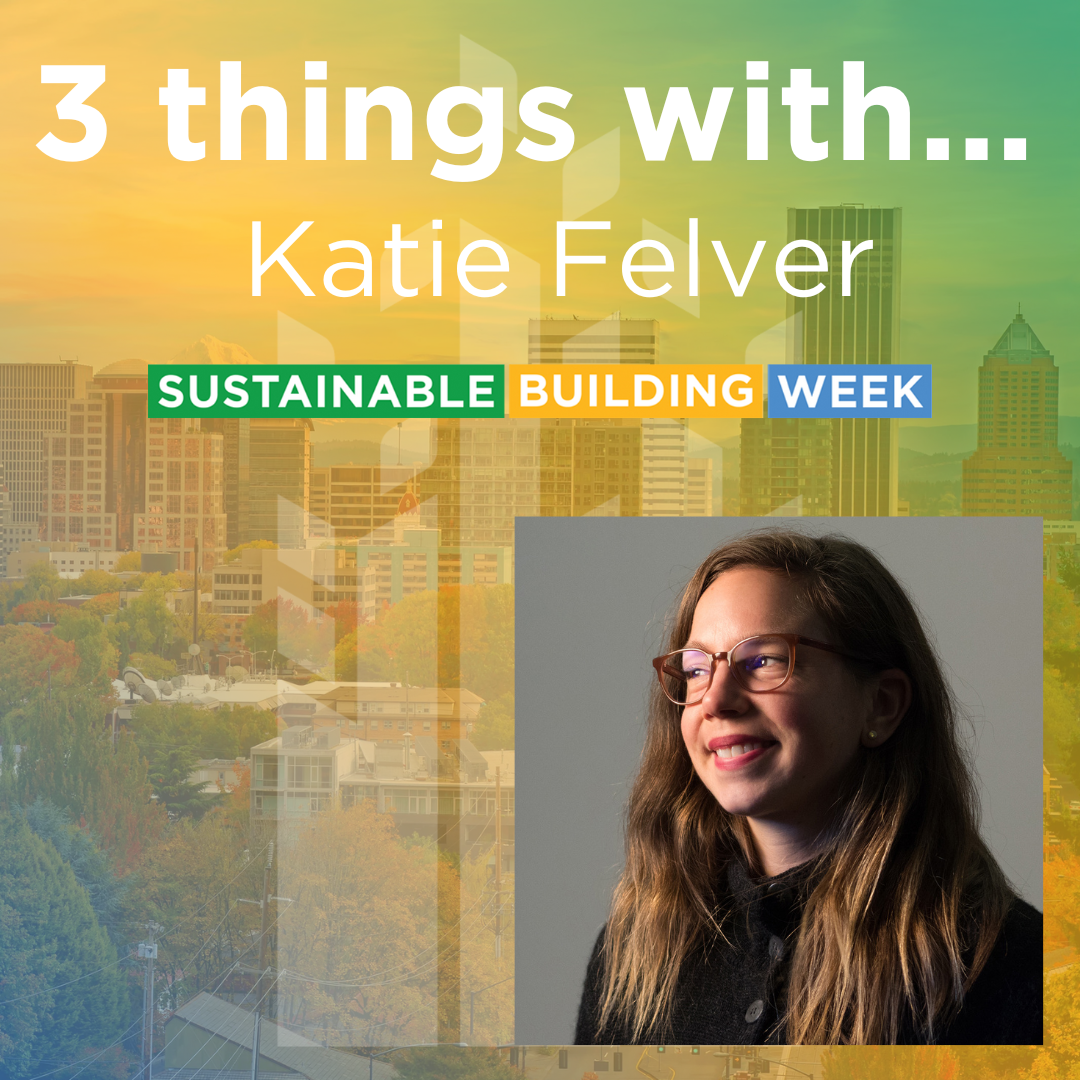3 Things with Katie Felver

3 Things with Katie Felver
Portland has an amazing sustainability community and we want to highlight the amazing people and work that shapes our unique city. As we get ready for this year’s Sustainable Building Week, we’re sharing their answers to questions we posed.
Meet Katie Felver. She’s an architect at Mahlum, where she focuses the majority of her time working on creating fun, healthy, and sustainable public schools. She also finds time to work with some carbon nerds in the office, creating and supporting design processes with all teams, as they widdle down the amount of environmental impacts their buildings are responsible for, including the ever-more popular global warming potential (aka Embodied Carbon). As an embodied carbon reduction enthusiast she also has devoted several years to helping lead the Portland Regional Hub for the Carbon Leadership Forum.
Take it away, Katie!
What does sustainable mean to you?
Right now sustainability for me is thinking more in terms of regeneration – how can a building be part of ecological healing? Some folks say regeneration is the step beyond sustainable, but with the current state of resources around the world, I feel like we need a hard shift to regeneration and healing before we can actually think of sustaining life and culture we strive for. I love this quote from Paul Hawken, where he says, “[t]he climate crisis is not a science problem. It is a human problem. The ultimate power to change the world does not reside in technologies. It relies on reverence, respect, and compassion – for ourselves, for all people, and for all life. That is regeneration.”
I see a strong need for us to shift the “human-centered” design focus to a “life-centered” design, and expand the deep empathy that we feel for people when we design buildings to the other non-human life, that buildings and what they are made up of, ultimately impact. I’m hopeful that we can work towards a future where the built environment is a helpful player in ecosystems, and no longer a degenerative force.
Name a Portland (or Oregon) project or collaboration that has inspired you, and tell us why you are inspired by it.
This is such a popular project right now, but I have to mention it! I’m really inspired by a few of the wood sourcing stories for the new Portland Airport terminal. As a whole – this building is elevating awareness of the impact of spaces on human well-being and regional design but it’s also putting a big flaring highlight on how wood sourcing conventionally works in the Pacific Northwest, offering a ray of hope that it can look different. This project is an example of an architecture firm partnering with a non-profit environmental organization to dig deeper into a subject that architects don’t usually get the luxury of time to dig into and showcases the importance of collaboration and systems thinking. I have thought for years that more architects need to involve less traditional AEC consulting in our design process in order to really create sustainable buildings, so I hope this work encourages others to form those relationships and expand thinking of what is possible on their design projects. The other really cool wood story for this building involves Sankofa Lumber and their salvage of “waste” material from the mass timber roofing panels, turning the scraps into SecondStory panels, that then went back into the airport as veneered finish paneling. Waste only becomes waste when it’s wasted, and this is such a great example of how we can utilize materials that often go to the landfill or get burned, for better purposes. Once you start to learn about the environmental impacts of harvesting wood (or any resource) for building materials, it becomes even more clear why a linear economy will not work, and cannot be sustainable or regenerative.
Tell us more about your event at this year’s SBW!
This year our local Portland Hub of the Carbon Leadership Forum is excited to partner with Prosper Portland for Sustainable Building Week. We are organizing a professional panel of the many players needed for successful adaptive reuse of buildings in Portland (and Oregon). Through recent funding, the State of Oregon will be incentivizing conversion of existing buildings in the state to affordable/work-force housing, and here locally Prosper Portland has conversion projects in the works for manufacturing start-ups in Old Town, so we’ll get some inside scoop on what that process has looked like.
We keep hearing that “the most sustainable building is the one that’s already built,” and are looking forward to a good conversation with builders, architects, and developers to understand the ways we can work with our existing building stock to extend the usable life of currently unused or underutilized spaces in the city.
To register for Katie’s event for Sustainable Building Week, go here.
- Tags :
- Sustainable Building Week
Recent News
September 23, 2024
September 09, 2024
September 19, 2023
Stay in the Know!
© 2024 Sustainable Building Week. Website by Triple Play Studio


